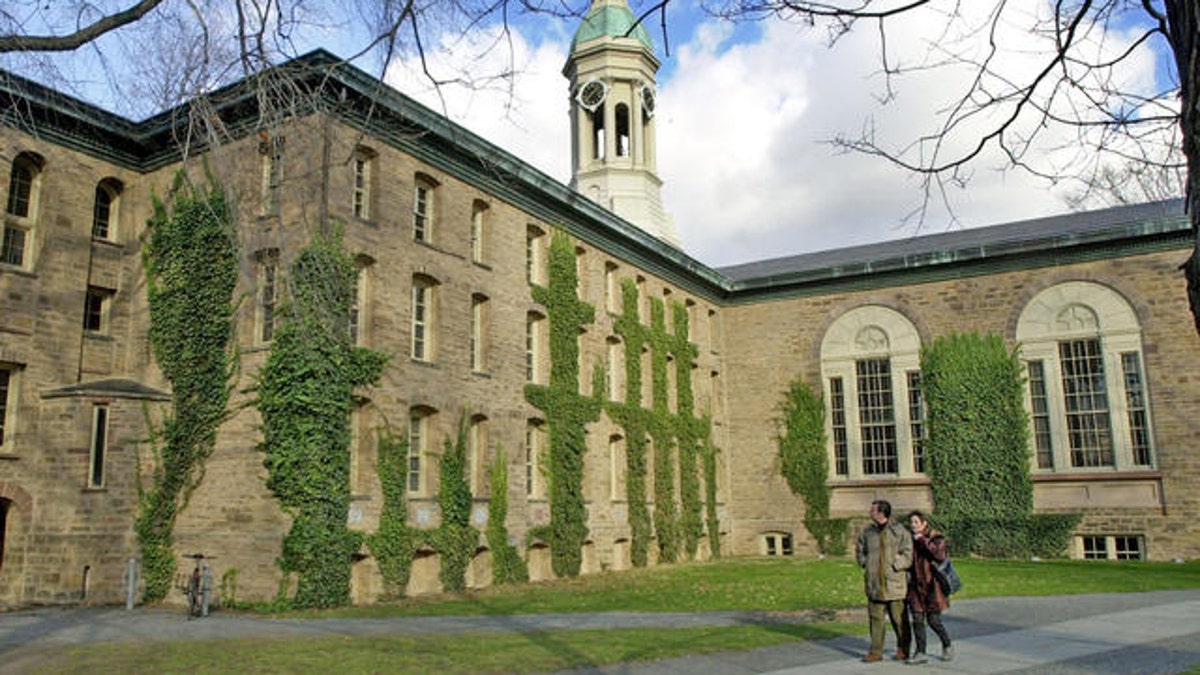
The Love and Fidelity Network, a student-run group built to counter the hook-up culture at elite colleges, like Princeton, is releasing half-page ads this Valentine's Day in 18 campus newspapers (AP). (AP2001)
A mandatory orientation session at Princeton University each year features a play called "Sex on a Saturday Night." It's a piece of student theater designed to teach naive freshman about the dangers of STDs, date rape, drugs and alcohol.
But in years past, as one observer remarked, the lesson came as a serious punch line to an otherwise comical presentation, rife with examples of various forms of sexual encounters -- none of which illustrated commitment in long-term relationships.
Welcome to what some are calling the hook-up culture, permeating just about every college campus in the country. It's a default mode of impulsive sexuality with few, if any, responsibilities.
It's this type of lifestyle the Love and Fidelity Network is targeting this Valentine's Day with half-page ads in the campus newspapers of 18 mainly Ivy League colleges and universities, including Yale, Harvard, Dartmouth and Princeton.
"We're working for a better reality of sex and relationship experience," said Cassandra Hough, director of Love and Fidelity Network.
Love & Fidelity Network is the spin-off of the Anscombe Society at Princeton, an organization created in 2005 by a group of students, including a couple of Rhodes scholars, to build a counter force to the hook-up culture. It lobbied to have a more romantically devoted character added to the “Sex on a Saturday Night” skit.
"There's an impression that chastity and abstinence, is just a list of no's," said Hough. "But we're embracing sexuality, human relationships and authentic intimacy."
The ads, co-sponsored by the Let's Strengthen Marriage organization, will run in connection with National Marriage Week, which ends on Valentine's Day.
There are two different ads. One shows a heart-shaped puzzle with a few pieces missing. The caption reads: "There's more to sex and relationships than campus culture suggests. We're filling in the missing pieces. Join us."
The other ad features a man holding a cardboard-shaped heart with the words "Will work for love," on it. The caption is the same about “campus culture” except the tag line is, "And we're doing something about it."
Hough said she believes her organization is tapping into the heartfelt desires of young people today who want meaningful relationships.
She's actually echoing a just-released poll of 13- to 18-year-olds by One Hope, which reported that 82 percent of them believed God intended marriage to last a lifetime.
But there's a big problem said Hough. "Young people growing up in a divorce culture have no understanding of how good marriages work." They're inundated, she says, with sexual content in movies, magazines, and on TV like MTV's explicit show "Skins."
Then there’s the ever-present peer pressure on campuses to be carefree and casual in their attitudes about sex.
Hough said the culture, to some degree, is enabled by college administrations. In 2009, students at Princeton were encouraged to attend something called Safe Sex Jeopardy, an event modeled after the long-running TV game show. The students were quizzed on their knowledge of things like anal intercourse, flavored condoms, sex toys and sado-masochism.
“The goal of the program is to provide students with accurate information to help them make whatever sexual decisions they choose to make in the healthiest way possible,” said Princeton spokesperson Emily Aronson.
Every other year, Yale University has what’s called Sex Week. It’s ostensibly a student-run health awareness program designed to spark dialogue. But it has been criticized for its raw sexual content and the involvement of its corporate sponsor, Pure Romance, a company that sells adult sex toys.
Hough and others argue such programs teach students to detach sex from love, making it difficult for them to form lasting relationships.
David Lapp, from the Institute for American Values, said he found young adults woefully uninformed about marriage. For example, a study he and a research partner conducted with a group of 20- to 34-year-olds in Ohio found most felt living together before marriage was a must.
But Lapp said research actually shows “it either doesn’t help the marriage or it actually hurts it.”
Hough said young people, particularly those at academically intense institutions like Princeton, know they must be highly disciplined to be successful in their chosen field. Love, she said, takes the same effort.
“They’re willing to commit to professions, but when it comes to relationships and marital stability, there’s a disconnect between good habits and preparations.”

